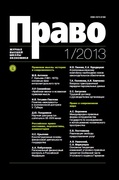International Law Cooperation Forms to Study and Explore Outer Space
Abstract
The article deals with the questions of international law cooperation and applying outer space. The article analyzes the concept of international law cooperation of states defined as a diversified activity of states implemented on the basis of international agreements in political, economic, research and legal areas, aiming to research and take advantage of peaceful space exploration in the interests and for the benefit of maintaining international peace and security and promoting economic stability and progress. This definition provides for two forms of cooperation: a) cooperation of states within the framework of international treaties at universal, regional and bilateral levels; b) cooperation within the framework of international organizations. These types presuppose seven forms of cooperation. The paper reveals and analyzes the major cooperation tendencies within space development. The most relevant tendencies at the current stage are participation of the commercial sector in space research, incorporating technological components into international law agreements. The paper also reveals characteristics of international cooperation in space including hierarchical connection of international law forms of cooperation of space as a form of cooperation to implement large-scale space projects. The article is concluded with the analysis of perspectives as to codifying international space law. A conclusion has been made that the codification of the law will start with soft law. Such a codification is to be considered as a positive tendency to test the methods of drafting, coordination and adopting a universal document to create a single unified space convention.
Copyright (c) 2013 Law Journal of the Higher School of Economics

This work is licensed under a Creative Commons Attribution-ShareAlike 4.0 International License.


















